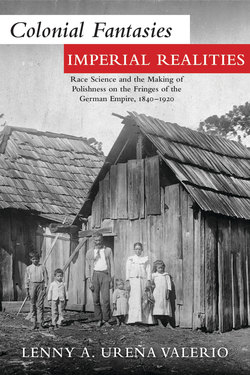Читать книгу Colonial Fantasies, Imperial Realities - Lenny A. Ureña Valerio - Страница 10
На сайте Литреса книга снята с продажи.
ОглавлениеSeries Editor’s Preface
Colonial Fantasies, Imperial Realities: Race Science and the Making of Polishness on the Fringes of the German Empire, 1840–1920 by Lenny A. Ureña Valerio examines the intricate story of attempts by the fin-de-siècle German state to subjugate and civilize its Polish territories in the east, of the Poles’ European aspirations that yielded up what one reader called a “colonial imagination” of their own directed toward Africa, and of the tangible efforts by Polish peasants to launch a vaguely parallel colonizing and civilizing mission in South America. For the Germans, the “wild East” offered itself up as empty space ripe and ready for absorption into the German Empire. The Germans’ colonial project entailed, of course, military control and administrative absorption, but also involved medical and public health projects among a subject population considered by the Germans culturally backward and racially inferior. Germans had kindred colonial ambitions in Africa, but, ironically, Polish intellectuals with political aspirations shared in these European colonial fantasies and coveted a similar African object of colonial desire. Meanwhile, rank-and-file Poles pursued a real colonial project of sorts, translating colonial dreams into the reality of a mass peasant migration to the jungles of Brazil where, with other European migrants, they settled in what for European adventurers was an even more unknown and seemingly impenetrable “Dark Continent.”
Colonial Fantasies, Imperial Realities is a work which perhaps could have been written only by a scholar like Dr. Ureña Valerio, herself Dominican-born but raised in Puerto Rico, whose own anticolonial perspective fortuitously escaped the constraints of lifelong immersion in the intellectual and discursive “iron cages” of American or European society and academe. It is one of the most legitimately transnational manuscripts since “transnational” projects and approaches came into vogue. The sweep of Ureña Valerio’s study, its joining together of such disparate and novel objects of study, and its engagement with central problems of the nineteenth and early twentieth centuries, namely, colonialism and race, mark this work out as a true intellectual tour de force that will contribute to remaking the historiography in several historical subdisciplines.
Publication of the Ohio University Press Polish and Polish-American Studies Series marks a milestone in the maturation of the Polish Studies field and stands as a fitting tribute to the scholars and organizations whose efforts have brought it to fruition. Supported by a series advisory board of accomplished Polonists and Polish-Americanists, the Polish and Polish American Studies Series has been made possible through generous financial assistance from the Polish American Historical Association and that organization’s Stanley Kulczycki Publication Fund, the Stanislaus A. Blejwas Endowed Chair in Polish and Polish American Studies at Central Connecticut State University, the Polish Institute of Arts and Sciences of America, and the Frank and Mary Padzieski Endowed Professorship in Polish/Polish American/Eastern European Studies at the University of Michigan–Dearborn, and through institutional support from Wayne State University and Ohio University Press. The series meanwhile has benefited from the warm encouragement of a number of other persons, including Gillian Berchowitz, M. B. B. Biskupski, the late Stanislaus A. Blejwas, Thomas Duszak, Mary Erdmans, Martin Hershock, Rick Huard, Anna Jaroszyńska-Kirchmann, Grażyna Kozaczka, Anna Mazurkiewicz, Brian McCook, Anna Müller, Thomas Napierkowski, James S. Pula, and the late Thaddeus Radzilowski, and from the able assistance of the staff of Ohio University Press. The series also has received generous assistance from a growing list of series supporters, including benefactor Thomas Duszak, contributor George Bobinski, and additional friends of the series including Alfred Bialobrzeski, William Galush, John A. and Pauline A. Garstka, Jonathan Huener, Grażyna Kozaczka, Neal Pease, Maria Swiecicka-Ziemianek, and Mary Jane Urbanowicz. The moral and material support from all of these institutions and individuals is gratefully acknowledged.
John J. Bukowczyk
